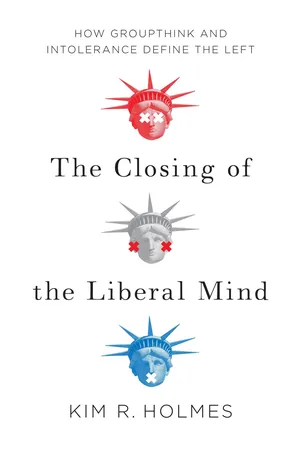
The Closing of the Liberal Mind
How Groupthink and Intolerance Define the Left
Kim R. Holmes
- English
- ePUB (adapté aux mobiles)
- Disponible sur iOS et Android
The Closing of the Liberal Mind
How Groupthink and Intolerance Define the Left
Kim R. Holmes
À propos de ce livre
A former U.S. Assistant Secretary of State and currently Acting Senior Vice President for Research at The Heritage Foundation, Kim R. Holmes surveys the state of liberalism in America today and finds that it is becoming its opposite—illiberalism—abandoning the precepts of open-mindedness and respect for individual rights, liberties, and the rule of law upon which the country was founded, and becoming instead an intolerant, rigidly dogmatic ideology that abhors dissent and stifles free speech. Tracing the new illiberalism historically to the radical Enlightenment, a movement that rejected the classic liberal ideas of the moderate Enlightenment that were prominent in the American Founding, Holmes argues that today's liberalism has forsaken its American roots, incorporating instead the authoritarian, anti-clerical, and anti-capitalist prejudices of the radical and largely European Left. The result is a closing of the American liberal mind. Where once freedom of speech and expression were sacrosanct, today liberalism employs speech codes, trigger warnings, boycotts, and shaming rituals to stifle freedom of thought, expression, and action. It is no longer appropriate to call it liberalism at all, but illiberalism—a set of ideas in politics, government, and popular culture that increasingly reflects authoritarian and even anti-democratic values, and which is devising new strategies of exclusiveness to eliminate certain ideas and people from the political process. Although illiberalism has always been a temptation for American liberals, lurking in the radical fringes of the Left, it is today the dominant ideology of progressive liberal circles. This makes it a new danger not only to the once venerable tradition of liberalism, but to the American nation itself, which needs a viable liberal tradition that pursues social and economic equality while respecting individual liberties.
Foire aux questions
Informations
Table des matières
- Cover
- Title Page
- Copyright
- Contents
- Introduction
- One: The Decline of American Liberalism
- Two: The Rise of the Postmodern Left
- Three: Why the Postmodern Left Is Not Liberalism
- Four: The Illiberal Style of Liberal Politics Today
- Five: Promethean Government Unbound
- Six: Bullies, Shaming Rituals, and the Culture of Intolerance
- Seven: The Death of the Liberal Intellectual
- Eight: The Troubled Legacy of the Radical Enlightenment
- Nine: The Closing of the Liberal Mind
- Conclusion: The Way Forward
- Acknowledgments
- Notes
- Select Bibliography
- Index